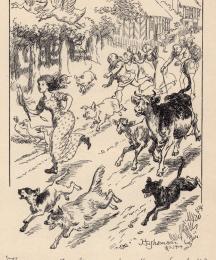Berbiolette
In Chretien’s Erec, Erec wears a cloak with fur lining from “strange beasts, which have heads completely blond and necks as black as mulberries, with scarlet backs below, black stomachs, and dark-blue tails. Born in India, such beasts are called berbiolettes… [they] find their only nourishment in fish, cinnamon, and fresh cloves” (84). Though the berbiolette is not referenced in any other text, its description here emphasizes its exotic nature. The use of this animal emphasizes the cost and rarity of Erec’s cloak, making it a fit garment for the newly-crowned king.
Frog
In the Awntyrs of Arthur, a ghost appears to Gawain and Guinevere; the spirit is surrounded by snakes and toads (ll. 120-21). The creatures here seem to emphasize the ghost’s otherworldliness as they cling to the ghost’s form.
Hare
The hare appears in the Alliterative Morte Arthure, when Arthur’s knights are struggling against the knights of Rome. Gawain declares, "So me God help, / We have been chased today and chulled as hares, / Rebuked with Romanes upon their rich steeds / And we lurked under lee as lowrand wretches!” (lines 1443-1446). Gawain’s comment suggests the hunting of hares as a courtly pursuit, and it also alludes to the helplessness (and perhaps even fright) of hares that find themselves in such a situation. Yet this comment also leads to a renewed effort against Rome, so that Arthur and his forces regain the upper hand.
In Chretien’s Erec, Erec wears a cloak with fur lining from “strange beasts, which have heads completely blond and necks as black as mulberries, with scarlet backs below, black stomachs, and dark-blue tails. Born in India, such beasts are called berbiolettes… [they] find their only nourishment in fish, cinnamon, and fresh cloves” (84). Though the berbiolette is not referenced in any other text, its description here emphasizes its exotic nature. The use of this animal emphasizes the cost and rarity of Erec’s cloak, making it a fit garment for the newly-crowned king.
Frog
In the Awntyrs of Arthur, a ghost appears to Gawain and Guinevere; the spirit is surrounded by snakes and toads (ll. 120-21). The creatures here seem to emphasize the ghost’s otherworldliness as they cling to the ghost’s form.
Hare
The hare appears in the Alliterative Morte Arthure, when Arthur’s knights are struggling against the knights of Rome. Gawain declares, "So me God help, / We have been chased today and chulled as hares, / Rebuked with Romanes upon their rich steeds / And we lurked under lee as lowrand wretches!” (lines 1443-1446). Gawain’s comment suggests the hunting of hares as a courtly pursuit, and it also alludes to the helplessness (and perhaps even fright) of hares that find themselves in such a situation. Yet this comment also leads to a renewed effort against Rome, so that Arthur and his forces regain the upper hand.
Hugh Thomson (1860 - 1920)




